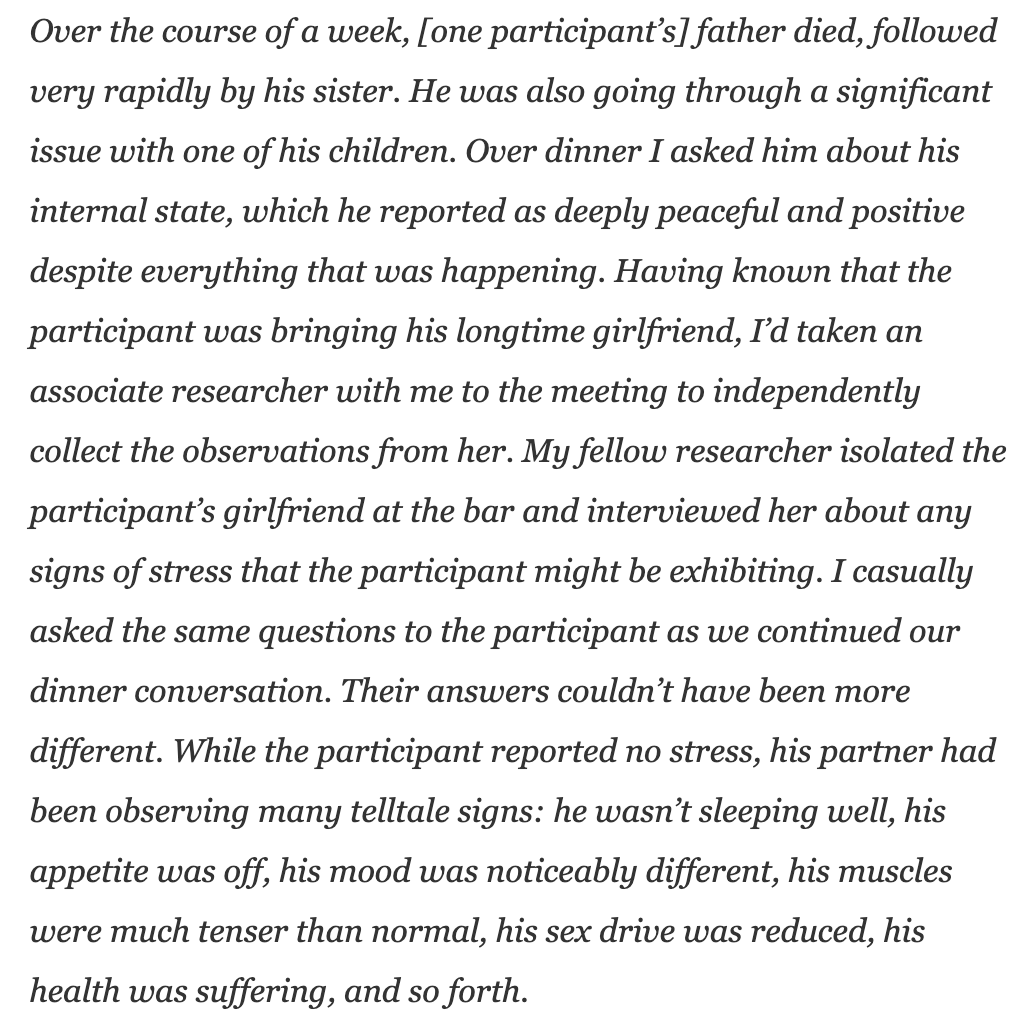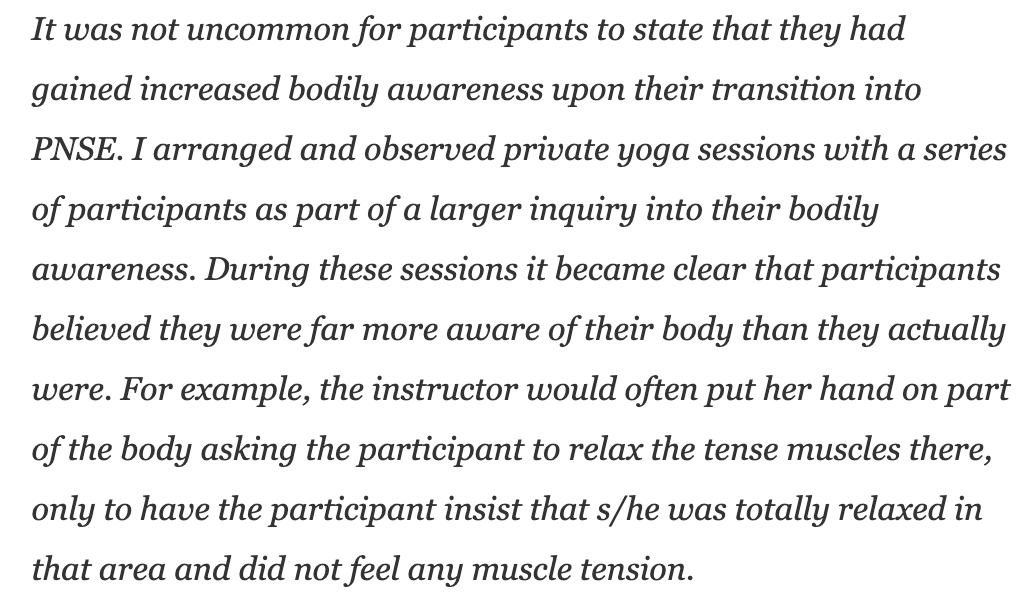A common refrain in our modern religious landscape is that enlightenment is a mental state that is agnostic w/r/t the revealed religion of the practitioner. To make this point, they cite some Christian mystics & heretics, compare prayer to meditation, and tell a story like this:
Hiding in your mind is a cosmic trigger that can fundamentally change the way you relate to the world. You don’t even have to believe in the supernatural for it to work. People from many different faiths have accidentally entered this state through their spiritual practices...
Even atheists can find this trigger, because it is activated, not by belief, but by various manipulations of the breath and the attention, and can be found through prayer, yogic stretching, or even a nice long walk.
There are two reasons that this teaching is attractive, especially in the modern West. The first is that it complements our desire for ideological and spiritual unity and equality, by allowing us to believe that all religions are merely windows to a universal spiritual truth
The second reason it& #39;s popular is, as Wyndham Lewis observed, is that science has taught us to regard our lives as machines, "and given us in our capacity of mechanics or scientists the itch to improve it". We have the image of an & #39;enlightened& #39; man as a more perfect machine
Indeed, there is a contradiction implicit in the desire for this kind of Buddhism, which is that we look at our failures to achieve our desires, and we see how our desires thwart our desires, and we decide that the way to get a leg up on ourselves is to become desireless
"If only I could overcome my desires [for drugs, for cheap sex, for video games, for sloth] then I would be able to achieve a higher purpose [my desires for power, industry, prestige, and expensive sex]" But this is exactly what purported enlightment does not mean.
Nowhere is this attitude on better display than in Aleister Crowley& #39;s famous essay on meditation in book four of his Magick in Theory and Practice. Only colossal wankers spells magic with a k. In this book he describes how enlightment is a form of power.
Crowley says that the great religious teachers of history, Jesus, Buddha, Moses, Muhammed, and Paul were all possessed of "Genius" or "Godhead", which is a kind of development of the human brain.
One recalls Daniel Ingraham& #39;s ludicrous statement that those who have passed through a threshold of insight he calls "Arising and Passing Away" will "find that they can now philosophize rings around those who have not attained to this stage"
This is the power that rationalist aspirants to meditation desire. Never mind that the rest of Ingraham& #39;s book describes a series of progressing madnesses which bear no resemblance to the disciplined stoicism that is advertised on the box.
I tried Vipassana after reading MCTB, many years ago, and I came to the conclusion that its a protocol for driving yourself towards a psychotic break. It& #39;s no wonder people who commit to this start believing they have psychic powers. Either god, a madman, or something much worse
Advocates of this “way in” to Buddhism claim that, if you brush aside some fanciful language, Buddhism contains a rigorous and empirical account of how to hack your subjective, first person phenomenological experience.
The "rationalist" finds this particularly appealing because it offers them a path to spirituality that seems to be lacking in any embarrassing theological baggage, and because it promises them something that they already idolize: emotionless, objective mental clarity
Suppose I put it to you this way: in the evolution of the human brain, one mutation gave such a competitive advantage that even though 99.99% of all humans never exploit it, all have a latent ability to unlock cognitive powers orders of magnitude beyond the default
The idea that your brain evolved a "god switch" cannot be reconciled with the theory of evolution. Such a juxtaposition does not stand up to even a moment of rational scrutiny, and yet many people with the audacity to call themselves rationalists believe it.
It is a truly impressive sleight of hand, that by presenting them with a Freudian account of Buddhism, people who otherwise claim to be rigid materialists, who literally study probability textbooks in order to have more logical beliefs about the world, can be so easily taken in.
AND YET-- it is undeniable that practitioners of Buddhism undergo some exotic mental states that exist on a continuum with spiritual ecstasies, and that some also manage to cultivate a powerful self-discipline, which can cross into other domains https://twitter.com/0x49fa98/status/1020811720216858624">https://twitter.com/0x49fa98/...
Of course, we could say the same about any monastic tradition; it& #39;s the "otherness", the "non-theological" nature of Buddhism that causes rationalists to drop the pretense and let themselves explore religious feelings, as long as, for the love of god, you don& #39;t mention Christ
If you sit quietly and train yourself to totally dissociate from all mental grasping then it’s possible to induce a phenomenological state we might call euphoric depersonalization. https://slatestarcodex.com/2019/10/21/the-pnse-paper/">https://slatestarcodex.com/2019/10/2...
"[practitioners] tend to be very effusive about this, saying that having the experience shattered everything they had previously believed in the most obvious and final way. But...the participants are not well-attuned to what is going on in their own heads
"It hasn’t given them infinite willpower or productivity or the ability to shoot qi bolts from their third eyes. It hasn’t even given them that much self-understanding. It’s just given them a different kind of internal experience...
"They don’t see themselves as having thoughts; computations obviously get done, but they are not in awareness. They don’t feel like they have stress, even if the stress is physiologically present and obvious from their actions.
Enlightenment as such is clearly a form of wireheading wherein the perception of fulfillment is induced even though nothing else actually changes. Exhibit #135867 in "knowledge-of-self is just one more faulty model, you can never know the thing in itself" https://twitter.com/0x49fa98/status/1203430871895699456">https://twitter.com/0x49fa98/...
It& #39;s fascinating and under-explored that you are frequently wrong about your own emotional states, wrong about your own desires, wrong about your own proclivities. Strategically wrong, you might say. https://twitter.com/0x49fa98/status/1023550713811501057">https://twitter.com/0x49fa98/...
I was disabused of any interest in Buddhism when I read Nietzsche& #39;s meditation on the Immaculate Perception. "That would be the highest thing for me"—so saith your lying spirit unto itself—"to gaze upon life without desire, and not like the dog, with hanging-out tongue:
To be happy in gazing: with dead will, free from the grip and greed of selfishness—cold and ashy-grey all over, but with intoxicated moon-eyes!
That would be the dearest thing to me"—thus doth the seduced one seduce himself,—"to love the earth as the moon loveth it, and with the eye only to feel its beauty
And this do I call IMMACULATE perception of all things: to want nothing else from them, but to be allowed to lie before them as a mirror with a hundred facets."—
Verily, not as creators, as procreators, or as jubilators do ye love the earth!
Verily, not as creators, as procreators, or as jubilators do ye love the earth!
But it shall be your curse, ye immaculate ones, ye pure discerners, that ye shall never bring forth, even though ye lie broad and teeming on the horizon! For already she cometh, the glowing one,—HER love to the earth cometh! Innocence and creative desire, is all solar love!

 Read on Twitter
Read on Twitter



